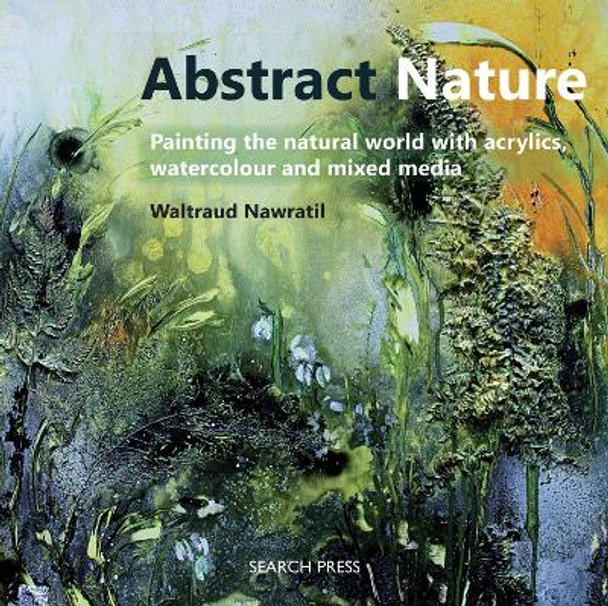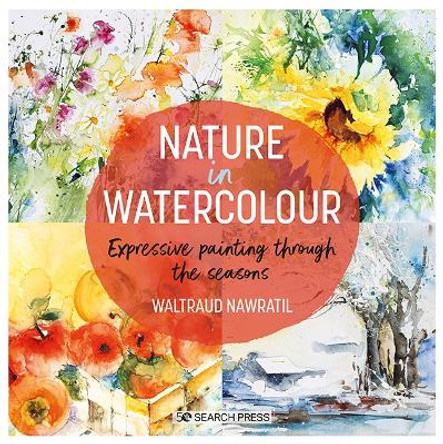Description
Austrian artist Waltraud Nawratil shows you how to combine a love for nature with a passion for expressive painting. It is divided into helpful sections to teach the reader how to use acrylics, watercolours or airbrushing, as well as natural materials such as sand, bark and leaves, to create captivating pictures full of colour and vitality.
There is a wealth of stunning abstract pieces by Waltraud which will provide inspiration for more experience painters as well as the beginner. The book covers the variations through all seasons, teaching the reader to see the natural world with creativity and a fresh new perspective.
About the Author
Waltraud has always been inspired by the natural world, choosing subjects from her surroundings with vibrant and attractive colours. She began her artistic career with watercolours before moving on to experiment with other techniques and media. Waltraud has worked as a freelance painter since 1995 and today she offers painting courses combining watercolour and acrylic painting techniques. She encourages her students to attempt variations on ordinary subjects in order to gradually develop their own style. Waltraud works from her own studio near where she lives in Schoenering, Upper Austria. Some of her pieces are available via the artists' platform International Graphics.
http://www.waltraud-nawratil.at
Reviews
This straightforward and easy-to-follow guide starts by keeping one foot firmly rooted in reality - you'll never be in doubt about what you're looking at.
It also provides the tools - including 22 individual projects - to truly create some beautiful abstract work.
-- The SAA * The SAA Catalogue 19/20 *This is not a new book. In fact, it has been reprinted for the second time. I'm including it because such a lot of people on my Multi-coloured WOW Course have been enjoying the painty parts of the course and I think they'd enjoy this book.
Many of the projects in this book work on stretcher frames which can be stitched if the surface is not too thickly encrusted. Also, the multimedia
approach lends itself to textiles as well as art-based projects. After a brief dash through inspiration, we arrive at the heart of the book. This comprises step-by-step instructions for completing a series of paintings based on multi-media techniques such as sand, paste, the use of natural materials and much more. Nature provides inspiration and the sections are divided into seasons. It does make you itch to have a go.
Feb 2017
This book (translated from German) that demands a one word summing up and the word that comes to mind is visceral. You may also feel that it shouts at you. Both the content and the presentation are so bright and ther is a constant sensation that you (or it) are standing too close, that a step back might allow you to take in the bigger picture. Take time to get used to this, you'll find a novel and interesting approach. The cover blurb refers to '22 stunning projects' and they're certainly stunning. Using the seasons provides a neat frame work and a narrative, though, and Waltraud's style is more interprative than full on abstraction, providing an easier way in. This won't be for everyone, but does make you think.
* The Artist *Inside this book is a liberating, freer approach to depicting nature that draws upon abstract styles and makes use of a lot more than just paint. Using acrylics, watercolors and mixed media the artist shows you how to produce bold, imaginative work that brings the natural world to vibrant life.
This is not a book aimed at the beginning artist but to those with experience who want to try something fresh and new. The artist uses a wide variety of materials beyond just the standard paints and brushes including stencils, pressed bark and found objects. Not only acrylics and watercolors are used either; airbrush paints, marble powder, pastes, binders and more are made use of so anybody attempting this type of work might be advised to stock up on more than just the basics. Following on from this is a section on using the various media with plenty of examples and inspiration. The rest of the book contains twenty-two projects, not the usual Search Press type with lots of photographic stages but briefer. These are organized in seasons, with each project covering two pages. There is a page-sized photograph of the finished piece plus a list of what you need and step by step instructions in five to six written stages. Subjects include flowers such as dandelions, ferns, daisies, poppies (several of these), trees, a pond, meadow scene and more. Describing them as abstract stretches the term somewhat as it is easy to see what the paintings depict; rather they are a freer, looser style which gives a vigorous outdoor appearance suitable to the subjects. At the back is a gallery where the author suggests people utilise the pictures as inspiration for their own, concluding a refreshingly different approach to painting nature.
* myshelf.com *Dec 16
Abstract Nature by Austrian artist Waltraud Nawratil looks at how to paint the natural world with acrylics, watercolour and mixed media. But rather than simply painting what she sees, Waltraud show us how to capture emotion you feel when looking at a particular scene and translate it into paint. Painting techniques and media are clearly explained before moving on to finding inspiration in the natural world throughout the year, and through the seasons with flowers and trees. The book includes step-by-step demonstrations and plenty of practical advice on abstracting the essence of what you see in the world around you.
* The Leisure Painter *If you're interested in abstraction but unsure of where and how to get started, this is a very good jumping-off point. Each demonstration occupies only 2 or 4 pages and is very straightforward, with a finished result, an enlarged detail, a materials list and a short series of simple steps. There is guidance in the introductory section on basic techniques and what to look for.
In truth, this isn't pure abstraction, and every example is easily recognisable. Rather, it's more an exploration of the limits of representation, and it's none the worse for that. Abstraction itself is the culmination of a journey of which this is a part and you should be able to take further steps yourself once you've mastered the basic
* www.artbookreview.net *The Austrian artist Waltraut Nawratil wants to paint pictures that radiate happiness and are able to transmit the happiness to the observer. In her colourful motifs she combines the softness of watercolour with the strength and dynamism of acrylic painting.
In this book you will see the seasonal changes in plants like flowers and trees over the course of a year.
In the first chapter Waltraud Nawratil tells something about the materials and tools she uses. For her mixed media technique, she needs brushes as well as unusual things like spatulas, roller and palette knifes. She prefers a mixture of acrylic paints, spray varnish, aquarelle watercolours and airbrush paints. Additional materials like marble powder, paste, acrylic binder, pressed bark or leaves and stencils are other important elements of her pictures.
The following chapter gives an overview of the preferred painting techniques and of a lot of examples. Valuable tips from her art studio help to avoid mistakes and give you interesting suggestions for image correction that are easily done with acryl paint.
The author searches and finds inspiration in nature. When a painter runs out of ideas he should walk amongst nature. The variety of colours and motifs inspires everyone. Every season has its own flowers and trees.
The next section follows the course of the seasons and shows the differences in the motifs and the chosen colours.
The chapter "Spring" starts painting with six examples step by step. A full page illustration and a detailed view assist a detailed text description, that also contains a detailed list of materials colours and tools. There are examples for every taste (Flowering dandelion, poppy and wild cumin, ox-eye daisy, birch trees in spring, spring mood in the forest) The other season are discussed equally detailed. The in the beginning shown true-to-nature examples get with new variations progressively more abstracted. At that the artist's experiments with different passepartouts, which she sprinkles with sand.
In the final chapter Waltraud Nawratil shows us a gallery of a few examples of nature in different variations.
Conclusion:
Abstract Nature is intended for advanced painters, who search ideas and inspiration for their own interpretations of nature studies with the mixed media technic. Not the exact step by step drawing is important, but the reading of informative texts, the observation of expressive, colorful pictures by W. Nawratil and of course the development of a personal abstract style.
http://kreativreview.blogspot.co.uk/2016/10/abstract-nature-by-waltraud-nawratil.html
* Kreative Review *Beautifully presented book, well laid out and with beautiful illustrations. Not as 'abstract' as I thought, more like the mixed media work I teach, but a great book for all that and full of ideas which my (adult) students will find inspirational and one or two ideas of techniques which I've been reminded of myself. Plenty of information and close ups of paintings so you have all you need to try the techniques without it being too didactic. The book is particularly good for those who like to work with acrylic, a book full of colour and covers materials, painting techniques and sources of inspiration as well as showing paintings throughout the seasons.
* Sonia Hawes *With its compact format, stunning paintings and individual style, this book should appeal to any lover of painting nature. The book is split into Materials, Techniques, Inspiration, and Seasonal Paintings with loose step by step instructions and tips. The paintings are vivid depictions of trees and flowers with energising brushstrokes. The artist uses acrylic, watercolour, airbrush paints and spray varnish as well as a number of modifiers and additions such as powders and pastes. She discusses her techniques, amply illustrated with examples of work. The subject matter is the natural world. Leaves are attached to the canvas and painted over, delineated whilst backgrounds form an almost uniform haze so as not to detract. She adds texture with sand, bark, tissue or paste. Alternatively, leaves are used for printing. It is an interesting book with unusual depictions of flowers and landscape scenes. As abstract work goes, the subject matter is actually easily distinguishable, an interesting textured style.
* YarnsandFabrics.co.uk *Book Information
ISBN 9781782212386
Author Waltraud Nawratil
Format Paperback
Page Count 112
Imprint Search Press Ltd
Publisher Search Press Ltd
Weight(grams) 408g
Dimensions(mm) 225mm * 225mm * 9mm




